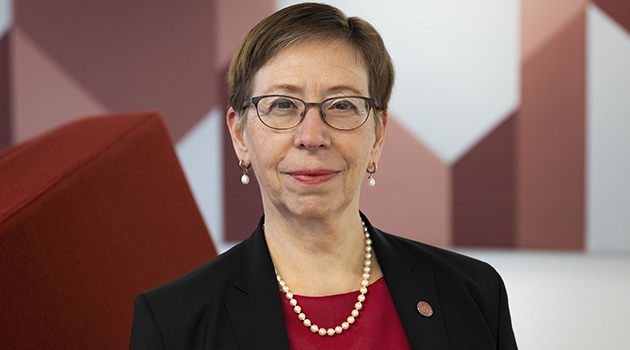“Healthcare needs to undergo some pretty big changes”
Hello to Eva Tiensuu Janson, Deputy Vice-Chancellor of the Faculty of Medicine and Pharmacy. You’ll be holding two seminars on precision medicine during Almedalen Week, hosted by Uppsala University. What is precision medicine?
“When you have a serious illness such as breast cancer, there are many different types of breast cancer. Each type may need to be treated in a specific way. It’s all about finding out exactly what tailored treatment a patient with a disease needs so that they can recover as much as possible.”
What will the seminars cover?
“One of the seminars we’re arranging together with the organisation Forska!Sverige is all about matters relating to precision medicine and precision health, how we’re going to make all this work in healthcare services, and in society. The second seminar is something we’re doing together with SciLifeLab and will be looking more at how can we take things to the next level, the technologies that need to be developed even more so we can be even more precise in our treatment. This is more research-oriented.”
What discussions do you want to get started?
“How we should prepare the healthcare services, and how we should achieve good development of research going forward so that we can gradually benefit patients even more.”
What is needed to make precision medicine more accessible in the healthcare services?
“The healthcare services will have to undergo some fairly major changes in the future. Precision medicine involves a number of costly methods. For instance, taking a sample and carrying out whole-genome sequencing is expensive, but financially, the healthcare services are given greater scope in other ways. Above all, patients don’t have to remain on sick leave for so long, and this is perhaps the biggest benefit for the individual but also at a societal level.
The lab work costs a lot, but on the ward it reduces the cost because the treatment is more precise. It ensures that the right patient receives the right treatment. Obtaining the resources to bring this approach into the healthcare services does present a challenge. The right parties have to have the resources, and the resources have to be channeled correctly so that this can be turned into reality on a broad front.”
How is Uppsala University doing as regards research into precision medicine?
“We have lots of successful researchers working on this from a range of different aspects; in pharmacogenomics, for example, which involves looking at genes that break down drugs. We use Car T-cells where each treatment is tailored to a patient, we sequence childhood tumours so that we can learn more about the genetics in that regard, and we’re working on rapid diagnosis of cancer. Precision Medicine Centre Uppsala, a collaboration between Uppsala University, Region Uppsala and Uppsala University Hospital, will be inaugurated on 21 June.”
Åsa Malmberg
About the seminars
Precision medicine centres benefit patients – but how to get the most out of them?
Precision diagnostics and treatment are being introduced broadly in Sweden. That said, is there the expertise in healthcare to exploit the opportunities and how can new research findings be used to produce the most benefit for patients? How do we ensure that diagnostic methods and treatments benefit everyone?
Time: Monday 4 July, 16:00-17:00
Venue: D Building, Uppsala University, Kaserngatan 1, "Torget"
Precision medicine of the future is technology and data driven
How do we ensure the development of top-class, equal and evidence-based precision medicine in Sweden? In order to implement new diagnostics and treatment, a rethink is now needed in terms of how we work together across academia, healthcare, industry and politics. Better national-regional coordination is also required.
Time: Tusday 5 July, 16:00-17:00
Venue: D Building, Uppsala University, Kaserngatan 1, "Torget"

